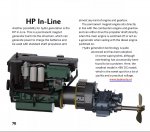doris
Well-known member
Looking at a possible new boat, and should the option arise, which should I specify, a conventional diesel/gearbox or a diesel electric hybrid????
Common sense says the hybrid but with the entire boating world being ridiculously conservative and resistant to modernisation, think of Freedom Yachts and carbon masts, a hybrid might be difficult to sell in the future.
A designed in battery would be part ballast, the generator can be put in the optimum position and an electric motor should be much more maintenance free than a gearbox. Would also have the likes of a Watt and Sea hydro generator as well.
Thoughts anyone???
Common sense says the hybrid but with the entire boating world being ridiculously conservative and resistant to modernisation, think of Freedom Yachts and carbon masts, a hybrid might be difficult to sell in the future.
A designed in battery would be part ballast, the generator can be put in the optimum position and an electric motor should be much more maintenance free than a gearbox. Would also have the likes of a Watt and Sea hydro generator as well.
Thoughts anyone???

